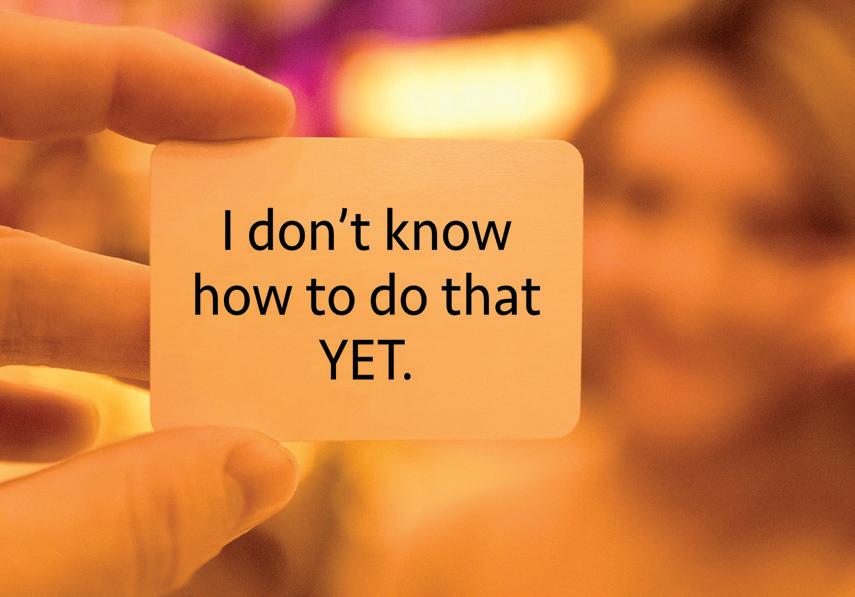
4 minute read
Growth-based mindset How to go from prove to improve
Growth-based mindset
How to go from prove to improve
by Erin Saunders, Leica Geosystems
Photo by Mikel Parera on Unsplash If having a growth-based mindset could be explained in one sentence, it would be moving from “I don’t know how to do that” to “I don’t know how to do that yet.”
Earlier this year, I did something that has been one of the most popular moves I’ve ever made as an HR professional: I killed our performance appraisal.
No more long forms. No more dreading of yearend conversations by employees and managers. No more employees hyper-focused on why they got a 3.6573 instead of a 3.6574. But I didn’t do away with performance management. On the contrary, we’re ramping up the ways in which we’re providing feedback to our employees. And it’s based in creating a shift in the organization from a traditional fixed mindset to a more adaptive growth-based mindset.
Why hasn't it worked?
Why don’t the traditional means of performance appraisals work well? I think we all know that it’s a process dreaded by managers and employees alike. But why?
A study conducted by the Neuroscience Leadership Institute found that both giving and receiving feedback lit up the part of the brain that’s our stress response, and goes back to our core fight or flight response.
Interestingly, feedback-givers were just as stressed out as askers. However, when people asked for feedback, it generated 50% less of a stress reaction in the body for both the giver and receiver of the feedback.
What do you want to achieve?
To understand how to manage performance better, we had to first understand what we were trying to achieve. The result was this: as an organization, we are ruthlessly focused on what’s important. To do that, we needed to move away from the traditional performance appraisal and instead move to ongoing coaching and feedback focused on continuously learning and being better.
What's your mindset?
First, it took some education around what it means to have a fixed mindset vs. a growthbased mindset. According to research from the Neuroscience Leadership Institute, people with a growth mindset are: > More open and able to integrate feedback, thereby increasing their intrinsic motivation to learn and perform. > Better able to learn from corrective feedback because the region of the brain used to process this type of feedback is more active - allowing individuals to interrupt their current processing and attend to novel and salient information.
> Better equipped to recover from setbacks and recalibrate their thinking and behavior in line with the feedback.
Fixed mindset is about being better than others. A growth mindset is the belief that skills and abilities can be improved, and that developing our skills and abilities is the purpose of the work we do.
Fixed mindset is about proving - which is much of what people focus on in traditional performance appraisals. A growth mindset is about improving. It’s about constantly being open to the idea that we each have the capacity to learn and grow as individuals. It also increases our own intrinsic motivation to learn and to perform. If having a growth-based mindset could be explained in one sentence, it would be moving from “I don’t know how to do that” to “I don’t know how to do that yet.”
Instead of having once-a-year conversations that are focused on proving what we’ve done, we’re having quarterly goal setting and feedback conversations on an ongoing basis. Year-end happens all year long. This means that as projects wrap up, as sales processes close, and as we progress professionally, we take time at the end of each process to spend some time asking three questions:
1.
What went well?
2.
What would we do differently next time?
3.

What did we learn in the process?

Over time we believe that creating this culture of growth mindset, continuous development, and ongoing feedback will increase employees’ satisfaction, allow them a greater sense of ownership in their work, and continue to support our organization to be nimble and find new and different ways to work. It’s okay to make mistakes if we are learning from them during the process.

Will this approach work?
Time will tell if this will be an effective move for our organization. But I believe the research supports what we’ve suspected all along: traditional performance management tools are not all that effective, and in some cases are actually de-motivating. Personally, I like being part of a culture that values learning, allows for mistakes, and believes in the growth and capabilities of its employees.
About the author
Erin Saunders is Regional Human Resources Business Partner with Leica Geosystems, part of Hexagon.
P: 770.326.9517 E: erin.saunders@leica-geosystems.com
Take your Lawns to the Level
Our bio-based fertilizers & specialty fertility products are blended to feed plants, improve soil fertility and build topsoil.

High Performance Plant Nutrients Fertilizers ▪ Specialty Products Soil Amendments ▪ Custom Blends
Fertility Forward®
MFR/Corp. HQ: Greensboro, GA Orlando, FL • Salt Lake City, UT










